70-hour workweek debate: Why Leaders in favour and against Narayana Murthy?
Sudha Murthy, Narayana Murthy's wife, stated that her husband values passion and "real hard work." "He has consistently put in 80 to 90 hours of work per week, so he's not familiar with anything less," she said.
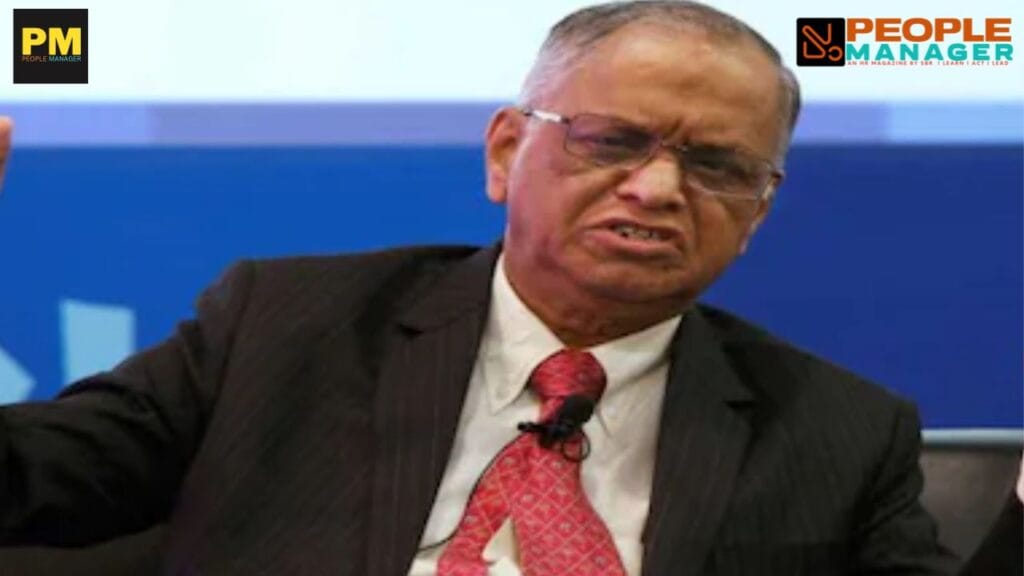
70-hour workweek debate: the leaders have mixed reactions in favour of and against Narayana Murthy’s thought.
In a world where individuals such as Alibaba’s Jack Ma, Elon Musk, and Tencent’s CEO Pony Ma have been known to call for increased working hours from their staff, it begs the question of today’s leaders’ stance on work-life balance. Furthermore, Infosys founder NR Narayana Murthy recently joined the discourse, expressing a similar viewpoint.
The 77-year-old stated that India’s potential to thrive and compete with economic powerhouses like China is dependent on a significant increase in its youth’s work productivity, urging that they commit to a 70-hour workweek.
Mr Murthy expressed these sentiments on the debut episode of 3one4 Capital’s podcast, The Record, during a conversation with former Infosys CFO Mohandas Pai. During their talk, they discussed China’s and the United States’ impressive economic success in recent decades.
Mr. Murthy went on to highlight India’s current level of work productivity, which is among the lowest in the world. He argued that in order to compete successfully with countries that have made great progress, India needs to address issues such as decreasing government corruption, streamlining bureaucratic decision-making processes, and significantly increasing job productivity.
He also urged company executives to engage with the younger workers and to emphasize the significance of dedication and commitment. “I hope our corporate leaders can address our youth and say, for the first time, India has received some respect.” Now is the time to consolidate and accelerate our progress. And for that, we must work extremely hard and increase our work output,” he stated.
But are today’s leaders in favor of a 70-hour workweek? Let us investigate.
Anupam Mittal founder of Shaadi.com
Anupam Mittal, a Shark Tank India judge and the creator of Shaadi.com
The entrepreneur captioned a selfie with his Shark Tank India co-judges, “Even after all these years, I’m still putting in 70-hour workweeks.” Aman Gupta, CEO and Co-Founder of boAt, Amit Jain, CEO and Co-Founder of CarDekho, Namita Thapar, Executive Director of Emcure Pharmaceuticals Limited; and Vineeta Singh, CEO and Co-Founder of Sugar Cosmetics, may all be seen in the photo.
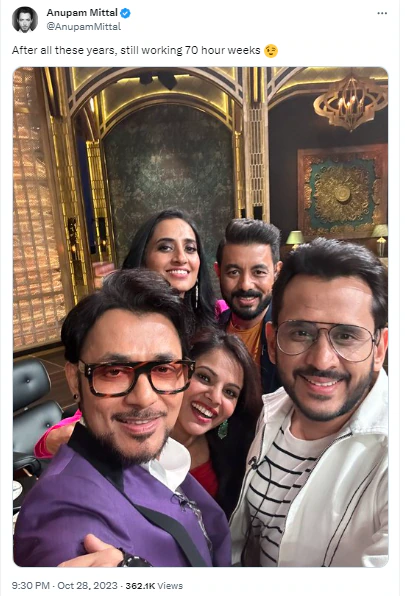
CP Gurnani, Tech Mahindra CEO
Mr. Murthy’s intention, according to CP Gurnani, was not only to work 70 hours for a company, but also to devote 70 hours to personal development and contributing to one’s nation. Mr. Gurnani encouraged young people to put in the 10,000 hours required to master their chosen field.
“Have been reading about the outrage to Narayana Murthy’s 70-hour work statement,” he wrote on X. When he mentions work, I believe he means not only the company, but also yourself and your country. He has not stated that he will work 70 hours for the company – he will work 40 hours for the company and 30 hours for himself.”
“Invest the 10,000 hours that make one a master in one’s subject. Burn the midnight oil and become an expert in your field,” he continued. That is 70 hours of work that can distinguish you as a young person and your country.”
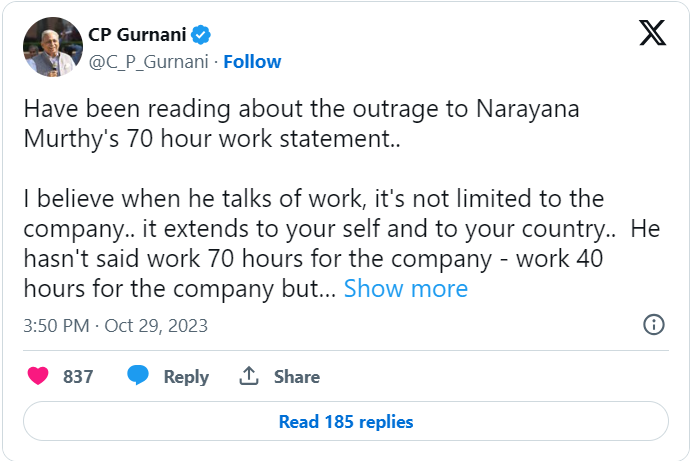
Mohandas Pai, Former Infosys CFO
On X, Mohandas Pai, the former Infosys CFO, defended Mr. Murthy and presented statistics on the weekly working hours of urban men in various states. The national average, according to the data, is approximately 61.6 hours per week. Mr. Pai stressed that the data clearly shows that “prosperity requires diligent effort.”
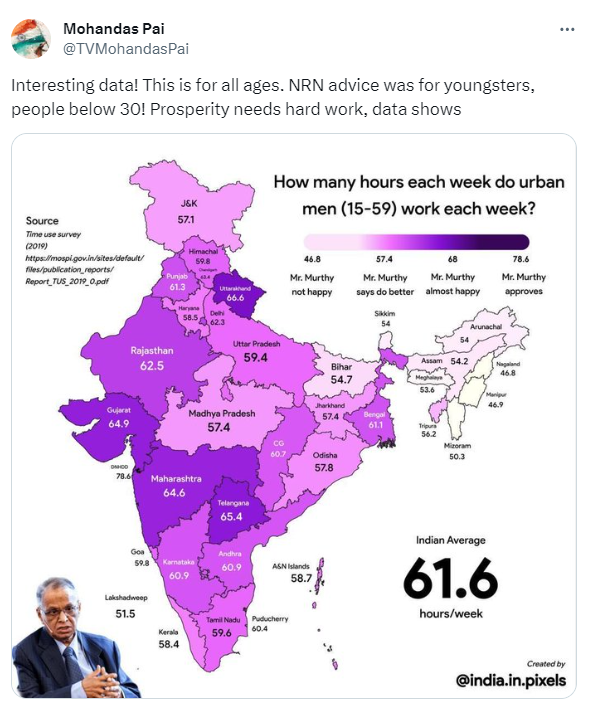
Sajjan Jindal, JSW Chairman
JSW Chairman Sajjan Jindal expressed his strong support for Infosys co-founder Narayana Murthy’s proposal for a 70-hour workweek on the same day. Mr. Jindal believes that because India’s circumstances differ from those of some developed economies, the country should not adopt “shorter work weeks” as the standard.
“I wholeheartedly support Mr. Narayana Murthy’s assertion.” It’s not about exhaustion; it’s about dedication. “By 2047, we must work to make India an economic superpower that all of us in India can be proud of,” Mr. Jindal stated in a post on X.
He went on to say, “A 5-day week culture is not suitable for a rapidly developing nation of our size.”
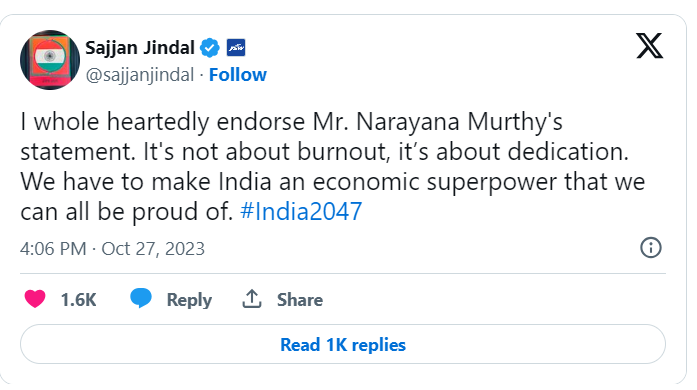
Radhika Gupta, Edelweiss Mutual Fund CEO and Managing Director
Radhika Gupta spoke about the issue, emphasizing the long-standing commitment of Indian women who have consistently worked more than 70 hours per week for many years.
“Between offices and homes, many Indian women have been working many more than seventy hour weeks to build India (through our work) and the next generation of Indians (our children),” Ms. Gupta said on X. For decades and years. With a smile and no request for overtime, Surprisingly, no one has debated us on Twitter.”
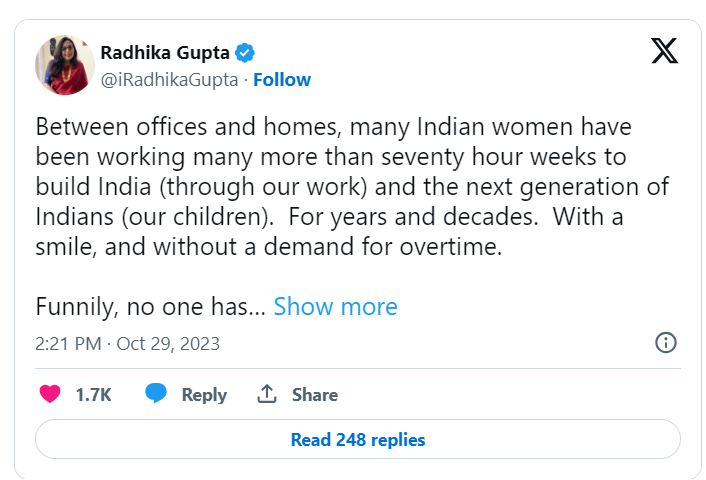
Bhavish Aggarwal, Ola CEO
Aggarwal agreed with Murthy’s assessment of Indian youth commitment to a demanding 70-hour workweek. Aggarwal emphasized the sentiment in a recent tweet, writing, “Putting in the hours. Not 70, but more like 140! Weekends are only for fun!”
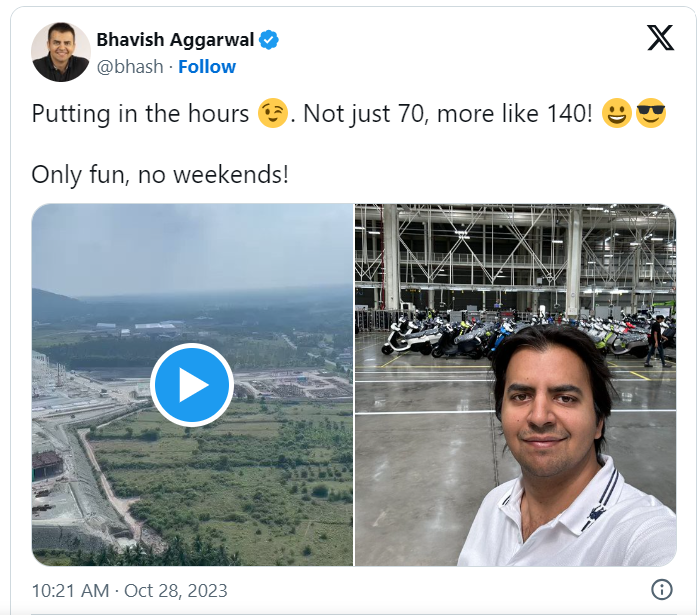
Harsh Mariwala, Founder and Chairman of Marico
Billionaire Harsh Mariwala disagreed with Infosys founder Narayan Murthy’s advice to young people. Marico’s founder and chairman expressed his opinion, emphasizing that both employers and employees should prioritize the quality and passion invested in their work over the number of hours worked.
“Reflecting on the recent sentiments expressed by Mr. Narayan Murthy regarding young people working 70 hours a week, I feel compelled to share my perspective,” he wrote on X. Without a doubt, hard work is critical to success, but it is not synonymous with the number of hours put in. It’s about bringing excellence and enthusiasm to those hours.”
The industrialist went on to say that in order to truly engage and motivate the country’s youth, they must be placed in roles that not only challenge them but also promote growth and learning. “When an individual envisions a path where diligent effort leads to a promising future, they are naturally inclined to give their best,” said the company’s CEO.
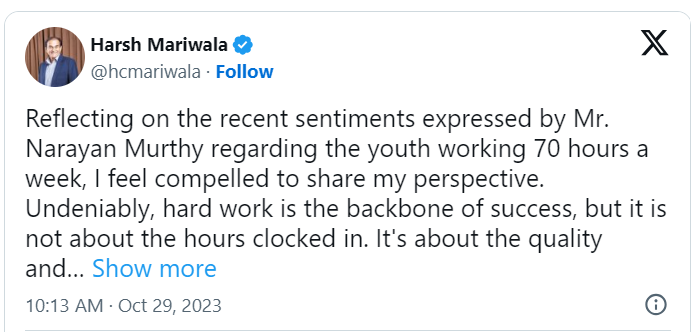
Ashneer Grover, Bharat Pe CEO
Ashneer Grover, CEO of Bharat Pe, mocked Murthy’s viewpoint, highlighting the prevalent emphasis on measuring work by the number of hours worked rather than the actual outcomes. Grover’s post on X elicited a wide range of reactions and reignited debates about workplace culture.
Grover wrote in a lighthearted post, “I believe people took offense here because the prevailing measurement of work is still ‘hours’ rather than’results.'” Furthermore, it appears that some believe that the only thing impeding India’s development is its youth’s perceived laziness. Getting offended, ironically, appears to unite us more than cricket, religion, caste, or language.”
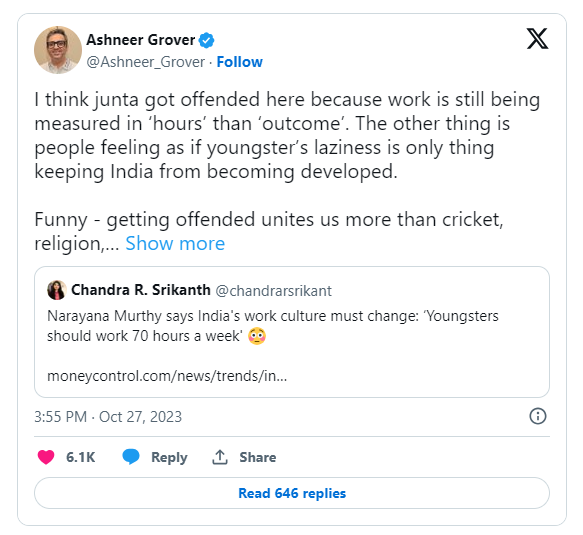
Dr. Vijaya Kumar S
Dr. Vijaya Kumar S, CEO of SSGL, supported Mr. Murthy’s statement about working 70 hours a week to build this country, which is a perfect example of how people can misinterpret passionate and well-thought-out statements.
There is nothing fundamentally wrong with his assertion. He is emphasizing the importance of hard work if India is to compete with developed Western countries. We are completely free to do whatever we want.
If we look at all the major pharmaceutical organizations in India, we can see that people like Dr. Anji Reddy, G V Prasad (DRL), Dr. Prathasarathy (Hetero) Dr. Kiran Mazumdar (Biocon), Dr. M Majjid (Sami-Sabinsa), Mr. Yusuf Hamied (Cipla), Mr. Surana (Microlabs) and others have worked tirelessly day and night, probably 16–18 hours a day, to build their dreams while building India.
Because they did not look at the “clock” while working on their passion, they are all associated with success today. The message is simple: if you want to be successful, you must work hard and smart. Working hard is probably the only option.
If a person is willing to take their work lightly, they should also be willing to take their life and success lightly. In the end, it is up to each of us to prioritize hard work, success, passion, or work-life balance. Mr. Murthy’s vision and passion for this country have increased my admiration for him exponentially.

However, Sudha Murthty backed the Murthy’s thought, “He has personally experienced working 80 to 90 hours a week, so he may not be familiar with anything less than that,” she said when asked about her thoughts on the ongoing debate over work hours. He places a high value on genuine hard work, and he has lived his life accordingly. As a result, he has expressed his opinions based on personal experience.”
Value our content… contribute towards our growth. Even a small contribution per month would be of great help to us. Since our establishment, we have been serving the industry through daily news and updates.
Our content is free for all, and we plan to keep it that way
Support the People Manager. Pay Here (All it takes is a minute)
- SHe-Box Portal Pushes Companies to Take Workplace Harassment Complaints Seriously: 2025 Report - February 16, 2026
- India’s Labour Codes Are Redrawing the Hiring Map- Tier III & IV Cities Emerge as the New Growth Engines: Report - February 11, 2026
- Girish Ramadurgam on Talent-Fitment” Problem: How to resolve the skill mismatch - January 19, 2026









